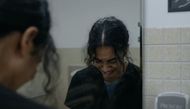The Pitt is a hospital drama series, which dropped recently and is being praised for being emotionally raw and gritty.
The show is set in Pitsberg and showcases a hospital overburdened with work. The finale shows the aftermath of the mass shooting, which is continuously becoming overwhelming for doctors and staff as they try to save as many lives as possible. The hospital staff is stretched to the limit. Dr. Robby — usually calm, collected, and focused — is thrown into chaos. He tries to save a young girl's life, but fails.
The finale, titled 9 P.M., delivered its most impactful shooter moment by focusing on the profound emotional and psychological toll of mass shootings on healthcare workers. Rather than sensationalising the violence, the episode centred on the aftermath, highlighting the trauma experienced by both victims and medical staff.
Read on to learn more about how the show delivered its most impactful shooting moment.
Here is what we know about the finale mass shooting episode
The finale comes with the most chaotic and raw scenes in The Pitt and showcases the aftermath of a mass shooting that occurred in the Pitt fest of the city. The narrative followed Dr. Robby, played by Noah Wyle, as he dealt with the death of a young patient, Leah, who succumbed to injuries from the shooting. In a deeply emotional scene, Robby broke down in the hospital's stairwell, grappling with feelings of guilt and helplessness. This moment portrays how even medical staff are human and how the profession affects their personal lives.
In an interview with The Wrap, the showrunner and creator R. Scott Gemmill speaks about the finale shooting scene in The Pitt.
"[The shooting] was one of those scenarios where it’s so overwhelming — even more so probably than COVID, because in this case, it was so acute that he (Dr. Robby) couldn’t get on top of it — and it finally just exploded and took him down."
What does the episode attempt to comment on, as per the makers of The Pitt?

The episode also addressed systemic issues, such as the lack of resources and support for medical staff, and emphasised the importance of mental health care for healthcare professionals. It comes up with a fresh perspective and the impact of gun violence and wars. It draws a direct connection with the situations of some countries around us dealing with civil wars and attacks that lead to an extra burden on the medical staff, especially.
John Wells, who directed episode 15, says in the interview that very conveniently the government demands the medical staff to "clean the mess" caused by their policies, but they should know its emotional cost.
“The federal government did note that gun violence is a health crisis … Because of our policies, we ask medical professionals to clean up the mess,” Wells told TheWrap. “It’s very important for people to understand the emotional cost that our current policies require of the people we asked to take care of what happens. Thoughts and prayers will only go so far.”
